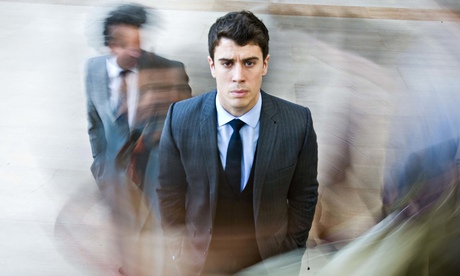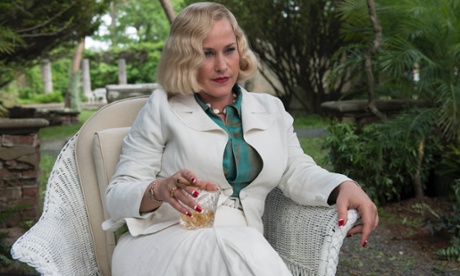‘Digital native” is a necessary but insufficient descriptor for the people who were born after the internet. There are the people who can’t remember a life before Google (indolent, afraid of elbow grease, rubbish at Dewey); the ones who were born after Facebook and Twitter, and can’t distinguish between real and fake news, actual and ersatz intimacy; and those born even later, after technology had turned life into a constant self-chronicle, every image recorded, for self-promotion or posterity, who willingly abet a surveillance culture that will corrode them before their lives have even begun.
But what, asks the Netflix sci-fi series Black Mirror – and it’s a question that stalks creator Charlie Brooker’s work more than any other – if we’ve got that all wrong? What if the operative word isn’t “digital” but “native”? What if the young have adapted to the new order perfectly well, and the people who really can’t handle it are us, the non-natives, the catcher-uppers? What if we’re the ones who will lose our sense of, first, proportion, then of morality and finally, self? What if the main problem for the next generation is not how to handle new technology but how to watch us not handling it and not hate us?
In the Arkangel episode, directed by Jodie Foster, a mother is given the opportunity to insert a chip into her three-year-old daughter so that she can never get lost again. You would, wouldn’t you? All the time you spend not actively trying to lose them, you spend worrying they’ll get lost. And because this is 2018, there is additional functionality – you can log in to see whatever your child sees, and interfere with it if you think it might be upsetting. A barking dog becomes a muted blur; porn is pixellated.
In this, the setup swerves from what’s available in the real world (we’re some way from being able to tamper with our children’s optical experience of reality), but the thrust of it – parental control taken to outlandish degrees in the name of security – is long-established. GPS monitoring is often dressed up as a fun smartwatch, like Weenect or AmbyGear. It can be targeted to a specific threat, so the Amber Alert GPS monitor tells you if your child is within 500 metres of a sex offender. Still more invasive devices include AngelSense, which allows parents to listen to their children’s conversations and get 30-second updates. This is marketed at the parents of disabled children – a vivid distillation of its principle, that your perception of your child’s vulnerability takes precedence over their interaction with the world. You could justify it if your child did indeed need you as its conduit, and could be prey to predatory behaviour without being able to express it. But every parent perceives their child as vulnerable; if their value to us is absolute, no risk to them is tenable, any damage that can be forestalled should be. I say this as a parent who bought her child a pogo stick for Christmas and would happily go back and unmake that decision.
Helicopter parenting – or its even more sinister successor, lawnmower parenting, where you travel ahead of your child’s every step and smooth its path – is more than just a function of new technology. These anxieties must have been around since the dawn of time, but until there was money to be made out of them, they would have been fondly scorned. Now, parental neurosis is huge money, a “billionaire’s game, not a millionaire’s game”, according to one US mother who paid a six-figure sum to a “family architect” to install webcams throughout the house, monitor them and text parents, or even speak directly via a screen, at moments of behavioural breakdown. But the real cost must surely be that of authority and intimacy. However spineless your parenting, at least your children never see you being told how to do it by text. Not unlike the great private tutor rip-off in the UK, these “architects” don’t have to be trained psychologists, just recent graduates, literate enough and with time to watch a family around the clock. There seems to be some kind of relationship between being in the business of mining human frailty, on the one hand, and having a deskilled and insecure labour force on the other, and I can’t think what that relationship might be.
Returning to Brooker’s mother/daughter dystopia, there is a psychosocial cost to the surveillance, as the protagonist’s daughter is ostracised as a de facto snitch – she can’t see anything without involuntarily showing what she sees to her mother – and chooses self-harm over the anaesthetic veil of protectiveness. But, broadly – I’m just keeping it simple, not subtly trying to avoid spoilers – she turns out OK. The mother, by contrast, is denatured by her control, incapable of stopping what she has started, careless of her daughter’s privacy and autonomy to the point that she becomes locked in the hyper-surveillance of parenting a baby even as the baby becomes a teenager. It’s not her daughter she infantilises, but herself: the act of trying to shield a child from the world is fruitless but not inconsequential. Compulsive prying transmutes into an elaborate narcissism, where her own need to know her daughter’s whereabouts is uppermost, any consideration of privacy or respect secondary. Like any addiction, it feeds itself; the more she controls, the less she can relinquish.
The thing that makes it interesting – no, wait, a mother-daughter dyad in which the mother is a narcissistic control freak is interesting in itself. But what makes this interesting in its own particular way is that you totally would, wouldn’t you? If you could, you would check what your child was doing whenever you felt like it. Only if she spent her life reading would your interest ever abate.
An entire narrative has evolved of the millennial snowflake, according to which the under-30s are missing a dermal layer; they can’t cope with conflict or being offended; they can be triggered by anything; they can’t have their worldview questioned. They like all their learning spoon-fed, and they can no longer spell.
Over the same period, “parenting” has become a verb, and risk-aversion has become intense and unquestioned. This is more noticeable in its physical iterations – it is not uncommon now to see toddlers wearing cycle helmets just to walk around. But where risk aversion meets technology on the one hand, and the normalisation of ceaseless monitoring on the other, the reach of the “responsible” parent becomes overweening. Parents will brag of their restrictions on screen time, their close attention to the content of what their child is watching. The boast “I let my child have 20 minutes’ privacy where I don’t even ask them what they’re doing” doesn’t exist. When a basic component of life – the screen – is considered essentially damaging to the young mind, there is no natural progression where the parent learns to back off and mind their own business. It is all understandable. To have children is to exist in a perpetual fog of catastrophic imagining. Protectiveness has a competitive aspect; procreating is a great leveller, and some people don’t want to be level.
Nobody’s to blame for any of it; but nor has anybody really considered that the people who are changed by modern childhood are not the children but the parents; it’s we who can’t handle life’s slings and arrows; we who lack resilience and a growth-mindset; we who can’t accept roughness and toughness as part of life; we who won’t grow up. (We can, however, spell.)
Black Mirror often generates not a criticism so much as a question, a lingering “and …?” Yes, we take your point about the dishevelment of politics, about the coarsening of public life, yada yada, but what do you propose we do? Brooker explicitly said, in an interview with the Financial Times, (I paraphrase) well, nothing – I don’t propose anything. He is a satirist, not a thinktank. But there was something unsatirically useful about Arkangel, something uncomically generative. Seriously, what if we’re looking for all society’s ills in the wrong place?











